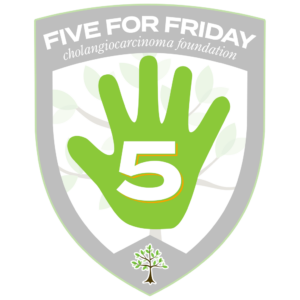
Five for Friday – 5 takeaways from GI ASCO 2022
Home / Blog / [wpbb post:title]
The American Society of Clinical Oncology Gastrointestinal Cancers Symposium (GI ASCO) is an annual global symposium that delivers the latest and most innovative science, research, and multidisciplinary educational content in the GI cancers field.
Cholangiocarcinoma Foundation leaders, members of our scientific and medical community, research advocates, and International Cholangiocarcinoma Research Network members (ICRN) attend, participate, and present each year.
Participation keeps us informed on leading-edge research and discoveries and helps to inform our research strategies and collaborations.
Single-agent immune checkpoint inhibitors (ICIs) had a modest effect on biliary tract cancer (BTC), an immunologically cold tumor. Thus, several combination approaches to improve the anti-tumor effect of ICIs are being conducted.
Here are some immunotherapy trials for biliary tract cancer patients presented this week at GI ASCO.


A Phase 3 Randomized, Double-Blind, Placebo-Controlled Study of Durvalumab In Combination With Gemcitabine Plus Cisplatin (Gemcis) In Patients (Pts) With Advanced Biliary Tract Cancer (BTC): TOPAZ-1
This is the first randomized multi-center phase III trial to evaluate the efficacy and safety of using durvalumab, a PD-L1 inhibitor, versus placebo combined with gemcitabine cisplatin followed by maintenance durvalumab or placebo till progression as first-line therapy.
The TOPAZ-1 trial showed a 20% reduction in the risk of death, with 24.9% of patients treated with durvalumab remaining alive after two years from starting treatment compared with 10.4% of patients treated with placebo. https://meetinglibrary.asco.org/record/204876/abstract

Phase II Study of Combination Pembrolizumab and Olaparib in Patients with Advanced Cholangiocarcinoma: Interim Results
This single-arm, phase II clinical trial aims to evaluate the safety and efficacy of combining pembrolizumab, an anti-PD-1 monoclonal antibody, with Olaparib, a PARP inhibitor. Out of 36 advanced cholangiocarcinoma patients planned to be enrolled, 12 patients have enrolled so far. The reported disease control rate is 41.6%, including one patient who achieved a partial response and 4 patients with a stable disease with tolerable toxicity. If you want to learn more about this trial, please visit https://meetinglibrary.asco.org/record/204979/abstract.

A Phase Ib/II Study (IMMCO-1) Of Atezolizumab Plus Tivozanib In Immunologically Cold Pancreatic, Gallbladder, And Biliary Cancers.
This single-arm phase Ib/II clinical trial evaluates the safety and efficacy of combining atezolizumab, a PD-L1 inhibitor, with tivozanib, an oral vascular endothelial growth factor receptor tyrosine kinase inhibitor in metastatic BTC patients who are microsatellite stable and progressed on at least one line of systemic therapy. Patients with known mismatch repair deficiency, microsatellite instability, or high tumor mutational burden will not be enrolled. This trial is currently enrolling patients. If you want to learn more about this trial, please visit https://meetinglibrary.asco.org/record/204948/abstract

Phase II Study Of Sitravatinib In Combination With Tislelizumab In Patients With Advanced Biliary Tract Cancer Who Have Failed To At Least 1 Prior Systemic Treatment: Trial In Progress (BTC-BGB).
This single-arm, phase II clinical trial aims to evaluate the safety and efficacy of combining tislelizumab, an anti-PD-1 monoclonal antibody, with Sitravatinib, a multiple receptor tyrosine kinases inhibitor in advanced BTC who progressed on prior therapy. Patients who received prior ICIs can be enrolled unless they had unacceptable toxicity. This trial is currently enrolling patients. If you are interested to learn more about this trial, please visit https://meetinglibrary.asco.org/record/205024/abstract.

Phase 2 Open-Label Study Of Pembrolizumab Plus Lenvatinib And Belzutifan In Patients With Advanced Solid Tumors.
This single-arm, multi-center, basket phase II clinical trial aims to evaluate the safety and efficacy of combining pembrolizumab, an anti-PD-1 monoclonal antibody, with Lenvatinib, a multiple kinase inhibitor, and belzutifan (MK-6482), Hypoxia-inducible factor-2 alpha inhibitor. Patients with locally advanced or metastatic BTC who progressed on prior therapy and never received immune checkpoint inhibitor therapy will be enrolled. This trial is currently enrolling patients. If you are interested to learn more about this trial, please visit https://meetinglibrary.asco.org/record/205195/abstract.
If you have something you’d like to share, please reach out to Allison Deragon at allison.deragon@cholangiocarcinoma.org.